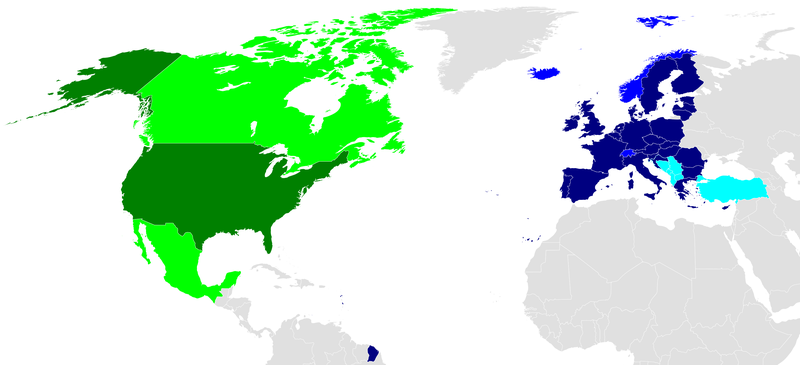
Wikimedia
There is increasingly informed public concern about the relationship between the NHS and the huge US/EU ‘free trade’ agreement, the Transatlantic Trade and Investment Partnership (TTIP). In response, the Labour Party is now making noises about exempting the NHS from this so-called ‘trade’ deal.
But how meaningful are those noises?
They are coming from Andy Burnham, Shadow Health Minister, in the New Statesman and at a Southwark Labour Party meeting on his return from Brussels. The other person promoting this apparent Labour Party take-up of the issue is Labour MP and Burnham's predecessor as Shadow Health Secretary, John Healey.
They acknowledge their close association on this.
John Healey, a professional spin-doctor, chairs the All Party Parliamentary Group promoting TTIP. This APPG is backed, financially, by British American Business (BAB), which is an instrument of the world’s biggest transnational corporations, including the biggest transnational banks. The APPG is a one of the vehicles bringing this level of transnational corporate influence to the heart of the UK parliament.
Thus any statement from John Healey must serve two masters, insofar as they are different and however they interact, the Labour Party and transnational business.
Andy Burnham says he had a positive response speaking about an exemption in Brussels to both the Commission and the European Parliament. But he is not the UK government, which is certainly against any carve out from the TTIP, and, importantly, although Burnham does lead on health in the Shadow Cabinet, there is no such commensurate call from the Labour Party leader.
Although the TTIP is negotiated by the EU Trade Commission, which has competence to do this on behalf of EU member states, an insistence on an NHS exemption would have to come via the UK government, as with the French ‘exception’ for audio visual services. And this can only come about from the strongest call from the Opposition, primarily from the leader, with maximum publicity to inform and energise the UK public to insist on it, thus forcing David Cameron to insist on it at the EU level. But we are not hearing any such noises from the Labour Party leader.
John Healey, in his New Statesman article on this issue, makes much of the fact that the EU’s chief negotiator on TTIP, Ignacio Bercero, gave seeming guarantees at a London meeting that the NHS was safe.
However in the same meeting, the TTIP promoters on the Euromove panel, Bercero, the CBI representative, Sarah Ludford MEP (Lib Dem) and the chair of the meeting, all claimed ‘huge gains’ from the TTIP. But even the most ambitious gains predicted by the study which the Commission itself contracted, show gains of only ½ of 1% (0.5%) GDP increase compared with a ‘no TTIP’ scenario, after 10 years. That is an increase of 1/20th of 1% (0.05%) a year for 10 years. And the other ‘huge gain’ claim, of an extra 543 euros of disposable income for a family of four, actually works out to the equivalent of a cup of coffee each a month. Surely, no one should, in honesty, be calling this ‘huge gains’. But they all did.
John Healey points to the provisions in the negotiated, but yet unfinalised, Canada/EU free trade agreement, CETA, as a ‘likely’ model for public service protection. He quotes this language: "Recognising the right of the Parties to take measures to achieve legitimate public policy objectives on the basis of the level of protection that they deem appropriate". But he omits what comes after – that this is the case so long as it fits with the provisions of the agreement. Thus these rights are actually subordinated to the provisions of the agreement, the exact opposite of John Healey’s devious assertion.
In addition, the complete text of the CETA is still secretive, so we can count on nothing in it anyway until it is made public.
The tricks, for instance in Healey’s article, are in the vagueness of key terms, e.g. the ‘may’ and the ‘can’, rather than more concrete terms. These are loopholes allowing the Labour Party to use this issue as a vote catcher while failing to commit to any real result.
Andy Burnham’s address in Southwark is a litany of current NHS disasters and an encouragement to vote in Labour in, in both the upcoming local and European elections, but says nothing about the missing national top-level Labour Party support for an exemption of the NHS. If the Labour Party is genuine on this issue, that support should be loud, clear and active now, not in a year’s time before a general election. TTIP negotiations are going ahead fast.
John Healey’s role as the big business mouthpiece for TTIP right inside the UK parliament does not inspire confidence that this is any more than a cynical trick. In another recent article he attempted to convince that the corporate bill of rights TTIP is a progressive agenda!
Top level Labour Party support for the TTIP to go ahead (on which Andy Burnham seems less than wholehearted) is very evident from Labour Party stringpullers. Douglas Alexander advocating ‘the avoidance of cheap populism’1 does not bode well for Labour Party responsiveness to the public call for an NHS exemption – and certainly not for stopping the whole agreement.
Is top level Labour completely behind what is a corporate bill of rights being presented as a ‘trade’ agreement, while tangentially pretending to support an NHS carve-out position?
We need more from the Opposition Party – real action that puts this vitally important issue centre stage, but, primarily, a seismic shift towards honesty.
Read more
Get our weekly email
Comments
We encourage anyone to comment, please consult the oD commenting guidelines if you have any questions.